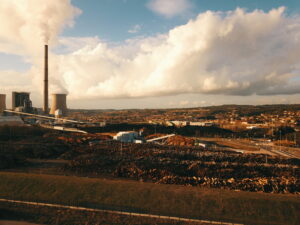Ecological and economical nonsense of new large-scale biomass plants in Belgium
By guest author Sara Van Dyck, Bond Beter Leefmilieu, Belgium
Today, biomass plays an important role in Belgium’s renewable electricity supply. But Belgian governments have just pledged more money towards new large-scale biomass plants even though a recent study clearly shows that biomass power is not only a risky option from an environmental perspective, it’s also a more expensive option compared to other renewable energies. Because of this choice, Belgian consumers will likely end up paying 2 billion euros more in subsidies than if their governments had chosen to invest in wind and solar instead.
We already know about the questionable environmental sustainability of the amount of wood pellets needed to fuel Europe’s existing large biomass plants. There simply isn’t enough sustainable biomass out there to supply existing plus all the future biomass plants planned in the EU. This means that as reliance on biomass grows, more and more wood pellets will need to be imported from places like Canada and the southeastern United States, and more natural forests will be cut.
A less known fact is that biomass is expensive. 3E energy consultancy conducted a study commissioned by Belgian environmental NGOs Bond Beter Leefmilieu, Greenpeace, WWF and Inter-Environnement Wallonie which proves that it’s simply economical nonsense for the Belgian government to invest in new large-scale biomass plants.
The study defines the extra costs of a scenario that focuses strongly on the use of biomass in large-scale biomass plants, as is currently planned by Belgian governments. This was done in comparison to an earlier study by 3E “Our energy future”, with a renewable electricity scenario for 2030 that focuses on using wind and solar energy.
What was found is that generating electricity from large-scale biomass plants is already very expensive and will only become even more costly as the price of imported pellets rises, as can be realistically expected due to increasing demand. On the other side, onshore wind and solar energy are now cheaper than biomass, and prices are only expected to keep falling.
Still, despite the evidence, Belgian governments have chosen to rely heavily on biomass instead of more renewable technologies. Flanders already has one operational biomass plant converted from coal. Now the Flanders government has plans to convert another former coal plant into a 100% biomass plant of 500 MW (burning approximately 1.6 million tons of pellets per year) as well as build a new big biomass plant of 215 MW. The Walloon government has a new biomass plant in the pipeline to produce 200 MW of energy.
Our studies paint a clear picture. If Belgian governments choose to burn biomass in big power plants instead of supporting cheaper wind and solar energy, consumers will pay €2 billion extra in subsidies from today until 2030 (€14 billion in total vs €12 billion). Sensitivity analysis on exchange rates (euros/dollars), efficiency and biomass price indicate that in a worst case scenario, costs will rise to €7 billion. In an unlikely best case scenario, €4 billion fewer subsidies will be required. Moreover, the huge import of biomass that will be needed to supply the plants will only amplify the energy dependency of Belgium on exports.
Belgian environmental organizations are therefore calling on Belgian governments to limit the share of biomass in the energy mix to a level that can be supplied sustainably. Moreover, that biomass be restricted to highly efficient cogeneration plants rather than large-scale plants that only produce electricity (inefficiently). Finally, strict sustainability criteria must be set so that only sustainable waste streams are used in the production of energy.
See the full study (also French and Dutch briefings)
Note: The views and opinions expressed in this guest blog post are those of the author and are not necessarily supported by BirdLife Europe/EEB/T&E.
Photo: Bilfinger converted a coal-fired power station in Rodenhuize near Ghent for the Belgian energy provider Electrabel and is now burning wood pellets. The raw material comes from Canada. (c) Bilfinger SE, Flickr Creative Commons





